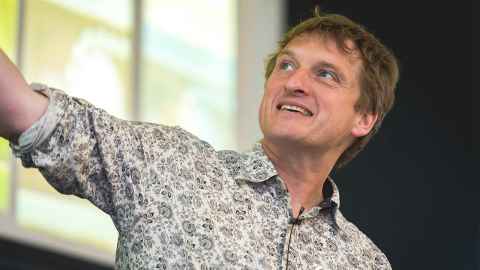Take 10 with... Richard Easther
Professor Richard Easther, from the Department of Physics, gives us 10 minutes of his time to discuss his research about the 'story of the Universe.'

1. Describe your research topic to us in 10 words or less.
Connections between the evolving universe and particle physics.
2. Now describe it in everyday terms!
I am a cosmologist — I want to understand the story of the Universe, from the Big Bang to the present day and into the infinite future. The Universe is a physical system, so it obeys the laws of physics, and we can make a huge amount of headway using physical principles we understand to explain what we see in the sky.
But the very early Universe involves energies far beyond the reach of any earthbound experiment, so I routinely think about physical processes at energies a trillion times higher than the interactions we observe in the Large Hadron Collider at CERN, in Geneva, which is the current highwater mark for experimental particle physics. At those energies we don’t really know the rules of the game we are playing, so cosmology is about discovering the fundamental laws of nature as much as it is trying to figure out how the universe works.
Likewise, 95% of the contents of the present-day universe appear to consist of dark matter and dark energy. We don't understand the fundamental physical basis of this “dark sector”, and a lot of my time is spent trying to test different ideas about what it might be.
3. What are some of the day-to-day research activities you carry out?
My research is primarily theoretical and computational, and involves a mix of literal pencil and paper, and coding. But if I’m honest, these days it’s mostly talking to students and post-docs, editing and proofreading. And sometimes having ideas, most of which have either already been had and published by someone else, or turn out to be dead ends. But every once in a while…
4. What do you enjoy most about your research?
The biggest thrill is still nailing a detailed calculation. But these days part of the fun is watching people I've worked with make their own careers; a couple of my former PhD students now have tenure, and others who are working for major companies.
5. Tell us something that has surprised or amused you in the course of your research.
I once gave a talk at Cambridge about a scenario in which the very early universe is full of tiny black holes. Energy leaks out of little black holes like these by a process called “Hawking radiation”, so if this model was was correct the early universe would be full of tiny, shining points of light — which we called “Hawking stars”. It’s a pretty fanciful idea and it was a bit tongue in cheek, but the model has some novel features that were interesting to explore.
But just as I was starting to speak the door opened and Stephen himself rolled in, in his chair – I felt like I should pay him a royalty for the use of his name each time I said it.
6. How have you approached any challenges you’ve faced in your research?
I was pretty naive about what it would take to have a research career when I started in the field. I did my PhD in New Zealand and we are much more tightly coupled to the “research frontier” now than was the case a couple of decades ago. So I didn’t realise that I would effectively be swimming upstream to work internationally in the field, but it worked out — with a big dose of luck, if I’m honest. So I think I dealt with my biggest challenges by failing to see them.
7. What questions have emerged as a result?
Not so much questions; but I got to set my own direction fairly early in career which has definitely given me an independent perspective.
8. What kind of impact do you hope your research will have?
I hope to figure out how the Big Bang worked and how the Universe began. But realistically, cosmology — like all science — is a collective, human enterprise. I can see a couple of lines of enquiry that were born in my office but are now being worked out by bigger groups of people in the field, and there is something really satisfying about that.
9. If you collaborate across the faculty or University, or even outside the University, who do you work with and how does it benefit your research?
Cosmology is a global community. Right now, as a theorist, I have active collaborations in the UK, Germany, and the United States. In the coming decade I am likely to be involved with LISA, a European space mission to detect gravitational waves, and the LSST, and giant telescope based in Chile that will survey the southern sky every four days, looking halfway to the edge of the visible Universe. I can’t imagine doing this any other way.
10. What one piece of advice would you give your younger, less experienced research self?
Follow your nose. Often calculations I did for fun (ok, “fun”) have had more impact in the long term than lines of enquiry that seemed to be solid strategic choices when I was working on them.